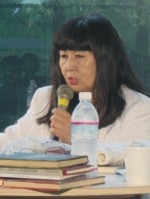Presenting Bangladesh to Japan
Kazuko Shiraishi talks about her work
Faza Haq
Ka zu ko Shiraishi, the visiting Japanese poet, says, 'I've come to launch my book which has been translated into Bangla. I would have spent more time in Dhaka, but I have to rush back to my ailing mother in Japan. I began writing as a teenager when I was introduced to the avant garde poetry group VOU, led by the modernist Katsue Kitasono, a pioneer in Japanese surrealism, who corresponded with Ezra Pound. With his encouragement, I published my first book of poetry, The town that rains eggs in 1951.'Keeping Joan Miro and Salvador Dali as her models, Shiraishi brought in abstract art forms in her poetry. 'I write about all that life has to offer, including the topics of nature, society and the position of women. I've travelled to different countries and met many people, and through my poetry I bring all these facets in my work,' Shiraishi says. 'I was a child when I moved from Vancouver to Japan before World War II and I often felt like an outsider to my own society, a feeling that stayed with me throughout my life. When I was a child the military government taught us to hate the British and American but I felt that this was wrong. I had the desire to go on striving, even though, at first, there was a lot of suffering around me.' In the 1960s, when jazz musicians like John Coltrane began to flourish in Japan, Shiraishi found inspiration in them. She was also influenced by the poems of Baudelaire and Dylan Thomas. 'I also loved the works of Alan Ginsberg,' she says. She got inspiration from the writings of Henry Miller, another exponent for freedom of expression. 'Reading poetry to the accompaniment of jazz music was something new for Japan and I was one of the first Japanese poets to experiment with this medium. My book Season of Sacred Lust was published in 1970 and I got the prestigious H Poetry Award. In the years that follow I went to 30 different countries and gradually got international recognition.' Today she has the honour of winning three Japanese prizes, the Takami Jun Award, the Yomiuri Award and the Purple Ribbon Medal from the Emperor of Japan. Asked which Bangladeshi poet appealed to her, Shiraishi says, 'Tagore, but of course; he is like a god in the poetry scene in Japan.' Talking about her introduction to the medium of poetry in Bangladesh, she says,'I came here as a presidential guest 17 years ago. In the course of this visit, I met Bangladeshi poet Aminur Rahman and we shared our views in our writings. He has translated my poems.' She enjoys meeting Bangladeshis and has many friends here. She has also written three long poems on Bangladesh. She introduced the country's beautiful scenery to the people in Japan, who until then had heard only about the floods and famines in the country. This she did in the form of photographs, which were displayed along with music and the recitation of her poems.
|

Japanese poet Kazuko Shiraishi |